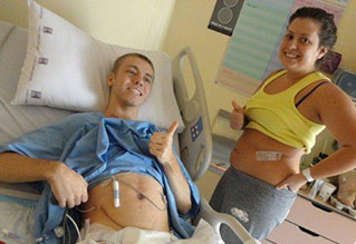
Checking the safety of an organ from a living donor
All living donors go through are assessed through a range of medical tests to check the health of their organs and if they have any viruses, including HIV, hepatitis, any sexually transmitted infections or West Nile virus.
The blood work that is needed to do these tests takes place when the donor is first assessed and again within 30 days of the transplant surgery.
Once your donor is suitable and cleared to donate their organ to you, your transplant nurse will arrange a surgery date.
In some transplant programs, you and your donor will be admitted to the same hospital. In others, you may be admitted to a children’s hospital while your donor is admitted to a hospital for adults.
If you and your donor are in different hospitals, the transplant program will arrange how to transport the organ from one hospital to the other as quickly and safely as possible.
Kidney paired donation
If someone is willing to be a donor for you but is not a match, you can both take part in the kidney paired donation (KPD) program. This is a computer-based program that helps find a suitable organ donor for you and a suitable person to receive an organ from the person who would like to donate to you.
When you are matched to a donor in this program, you will not know who they are or get any information about them. The donor has the right to privacy and confidentiality. It is important to respect this right. It is also the law. In turn, the person donating to you will not know who you are or have any information about you.
A donor under the kidney paired donation program could be admitted for their surgery to the same hospital as you or to a different one, possibly anywhere in Canada. If they are in another city, the organ would be flown from there to your city.
The person who would like to donate to you, but does not match you, will choose if they want to travel to a different city or stay in their own city for the surgery.
If this option applies to you, your transplant team and the team that assesses the donor will discuss this option with you in detail.
You can learn more about living donation from the Kidney Foundation. You can find out how living donors are evaluated for their suitability from the University Health Network.






